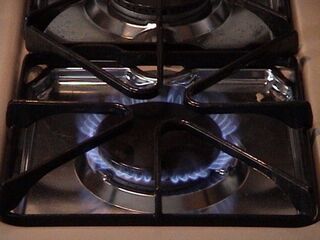Dementia
Stay Safe in the Home With Dementia
Guns, knives, stoves, and power tools can all lead to disasters at home.
Posted September 22, 2023 Reviewed by Davia Sills
Key points
- Accidents are more likely to happen to those with dementia.
- At the first sign of difficulty with the stove, find a method to make it safe—or deactivate it.
- Don’t let the sink or tub overflow, put away knives, and consider childproofing the cabinets.

Be safe in the kitchen.
One of the more serious consequences of memory problems is that individuals may leave the stove on, which can result in damage to pots, pans, and sometimes an entire house. We feel strongly that safety measures must be instituted at the first sign of any difficulty using the stove or remembering to turn it off. Which safety measure to institute depends on the problem with using the stove, how impaired your loved one is, and whether cooking on the stove is important for them.
Below, we list a number of possible solutions. If you’re not sure which is best for your loved one, please consult their doctor.
- Unplug the stove so that it cannot be used. Have them use a microwave, toaster, or slow cooker instead. This is an easy solution when the stove is not needed.
- Take the knobs off the stove so that it cannot be used. If you keep the knobs with you or hidden in the house, this solution has the advantage of allowing you and others to visit and use the stove when you wish to while keeping your loved one safe when you are not there.
- Have an electrician install a switch in a hidden or difficult-to-reach location such that you can use it but your loved one cannot. This solution also has the same advantage of allowing you and others to visit and use the stove when you wish while keeping your loved one safe when you are not there.
- Install a motion sensor automatic stove shut-off device. These devices will turn the stove off after a number of minutes (that you can set) if no motion near the stove is detected. Although cumbersome when cooking chili or stew that requires simmering for a long time, this device is ideal for many families.
- Install a smoke-alarm detector automatic stove shut-off device. These devices automatically turn off the stove when the smoke detector alarm sounds. We don’t usually recommend the device by itself, but it can be a good backup plan when used with other methods.
- Combine several of these methods together. For example, if your loved one is usually a reliably safe cook who nevertheless does occasionally walk away and forget that they have something on the stove, install both the motion sensor device and the smoke-alarm detector device.
Stop the sink or tub from overflowing.
Although not generally as serious as leaving the stove on, leaving the water running in the tub or sink such that it overflows and floods the house can cause serious damage. There are many solutions to this problem; below, we list several.
- Turn off the water pipe to the sink or tub that is overflowing. This solution works well if there are several sinks and tubs in the house, and only one of them tends to be forgotten and left to overflow.
- Use a tub alarm. There are many models available; find the one that works best for your situation.
- Have a plumber help to enlarge the overflow drain or decrease the flow of the water such that the tub or sink cannot overflow. Overflow drains in sinks and tubs are designed to prevent them from overflowing. The problem is that, sometimes, the flow of water exceeds the capacity of the overflow drain. A plumber can help.
Other safety issues
The safety of you and your loved one should always be your first priority. There are a number of other things you can do to help ensure your safety and theirs.
- Give away guns. Accidents with guns happen to people whose thinking and memory are normal, and they are much more likely to happen to those with dementia. Most police stations accept firearms.
- Give away power tools. As with guns, accidents often occur with power tools in those with dementia. Give them away to family, friends, or neighbors.
- Put away knives. If your loved one might injure themselves with a knife—or might threaten you with one—use childproof locks or put them in a place where they won’t be found.
- Consider childproofing the cabinets. Most individuals with dementia do not try to eat or drink non-food items, but if your loved one has frontotemporal dementia, they might. If this is the case, you’ll want to childproof your cabinets or hide any cleaning fluids and dangerous chemicals. Similarly, you may need to lock the refrigerator and food cabinets if your loved one engages in binge eating.
- Stay safe in the car. If your loved one has tried to get out of the car while it is moving, there are two things you can do. First, have them sit in the back of the car and put the child locks on—that’s usually a switch that you can access on the car door itself when the door is open. Second, if you search “seat belt lock” on the internet, you will find various inexpensive items you can purchase to prevent your loved one from being able to take off their seat belt.
- Call family, friends, or the police. If an aggressive situation with your loved one is escalating, or you are concerned that it might, don’t hesitate to call family, friends, or the police (by dialing 911 in most areas of the United States).
- Get out of the house. Sometimes, leaving the house for 10 or 15 minutes is the best thing to do if an aggressive situation is escalating. Within a few minutes, your loved one may forget what the argument was about and even that they were upset.
© Andrew E. Budson, M.D., 2022, all rights reserved.
References
Budson AE, O’Connor MK. Six Steps to Managing Alzheimer’s Disease and Dementia: A Guide for Families, New York: Oxford University Press, 2022.
Budson AE, O’Connor MK. Seven Steps to Managing Your Aging Memory: What’s Normal, What’s Not, and What to Do About It, New York: Oxford University Press, 2017.
Budson AE, Solomon PR. Memory Loss, Alzheimer’s Disease, & Dementia: A Practical Guide for Clinicians, 3rd Edition, Philadelphia: Elsevier Inc., 2022.


